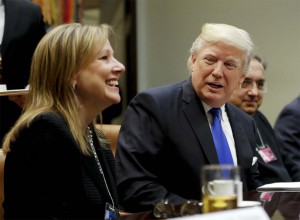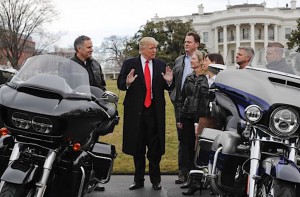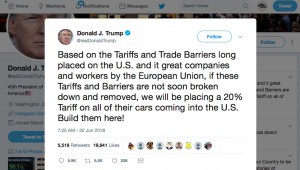
GM CEO Mary Barra has attempted to provide counsel to President Donald Trump, even as his policies have negatively impacted automakers.
Everywhere President Donald Trump looks these days is another message saying, essentially, don’t do this.
“This” in this instance is an attempt to raise tariffs against multiple trade partners at the same time. Trump, who made trade a central piece of his election campaign, has managed to either increase tariffs or threaten to do so against Canada, Mexico, China, Japan and the European Union.
Right now, Canada has already instituted retaliatory tariffs against the U.S. as has the EU for the tax on imported aluminum and steel. Trump responded by threatening to put tariffs on even more items, including a 20% on vehicles from the EU.
Instead of backing down, trading partners have responded in kind with similar threats, although the numbers tend to be a little higher, i.e. the U.S. tariff threat total of $200 billion was met by the EU’s threat of $300 billion.
(Trump threatens Harley-Davidson with new “huge” tax. Click Here for the story.)
On top of the significant push back from governments around the world, the moves have U.S. companies warning the Trump administration that continuing on this path will ultimately mean higher prices for U.S. consumers and hundreds of thousands of jobs.
“Increased import tariffs could lead to a smaller GM, a reduced presence at home and risk less – not more – U.S. jobs,” said General Motors, the country’s top domestic automaker, in comments submitted to the U.S. Department of Commerce last week.

President Trump has gone from being supportive of Harley-Davidson to threatening the company with a "huge" tax.
“The threat of steep tariffs on vehicle and auto component imports risks undermining GM’s competitiveness against foreign auto producers by erecting broad brush trade barriers that increase our global costs, remove a key means of competing with manufacturers in lower-wage countries, and promote a trade environment in which we could be retaliated against in other markets,” the company said.
Other companies have also made their points clear about the potential and current impact Trump’s trade policies are having their bottom lines. Harley-Davidson is moving some production from its U.S. plants to overseas facilities because the current tariff tit-for-tat with the EU raised the price of its U.S.-built motorcycles $2,200.
Trump took the Milwaukee, Wisconsin-based company to task for several days over twitter over the move, including threatening them with a new “huge” tax, which he didn’t clarify. Again over the weekend in an interview on Fox News’s “Sunday Morning Futures,” he lambasted Harley.
He expressed his disappointment in the company and warned that it’ll pay for the move in the long run because “Everyone who ever bought a Harley-Davidson voted for Trump,” he said.
However, another motorcycle manufacturer is also following Harley’s lead. Polaris Industries, which produces Indian Motorcycles, confirmed the company could move some production from northwest Iowa to Poland.
“Nothing is definitive,” Polaris spokeswoman Jess Rogers told Bloomberg News. “We’re looking at a range of mitigation plans.”
(Click Here to see how “nearly every segment of auto industry” is threatened by Trump trade tactics.)

President Donald Trump issued another threat to place a tariff on EU-build vehicles coming into the U.S.
The administration has received comments from every major automaker – foreign and domestic – warning him of the detrimental impact his policies will have on the country, adding up to more than 180,000 lost jobs.
The escalating tariff war between the United States and the European Union, heighted by a threat of a 20% tariff on EU-imported vehicles, could result in vehicle prices rising an average of $5,800 and eliminate hundreds of thousands of jobs, according to study by the Peterson Institute for International Economics.
The study further suggests that the cost to U.S. jobs from the import duties would be at least 195,000 jobs. It could be as high as 624,000 jobs if other countries retaliate.
The Alliance of Automobile Manufacturers, which represents General Motors, Ford, Daimler, Toyota and others, are imploring Trump to not pursue this plan of attack, noting that if he continues it could ultimately cost consumers $45 billion annually.
“We believe the resulting impact of tariffs on imported vehicles and vehicle components will ultimately harm U.S. economic security and weaken our national security,” the group wrote, calling the tariffs a “mistake” and adding that imposing them “could very well set a dangerous precedent that other nations could use to protect their local market from foreign competition.”
The group representing major foreign automakers, including Toyota, Volkswagen, BMW and Hyundai, the Association of Global Automakers said the tariffs would harm automakers and U.S. consumers.
(To see more about Trump’s auto tariff threat triggering backlash, Click Here.)
“The greatest threat to the U.S. automotive industry at this time is the possibility the administration will impose duties on imports in connection with this investigation,” the association said. “Such duties would raise prices for American consumers, limit their choices, and suppress sales and U.S. production of vehicles.”

I guess all those unemployed auto workers can get jobs in coal mines and building the border wall.